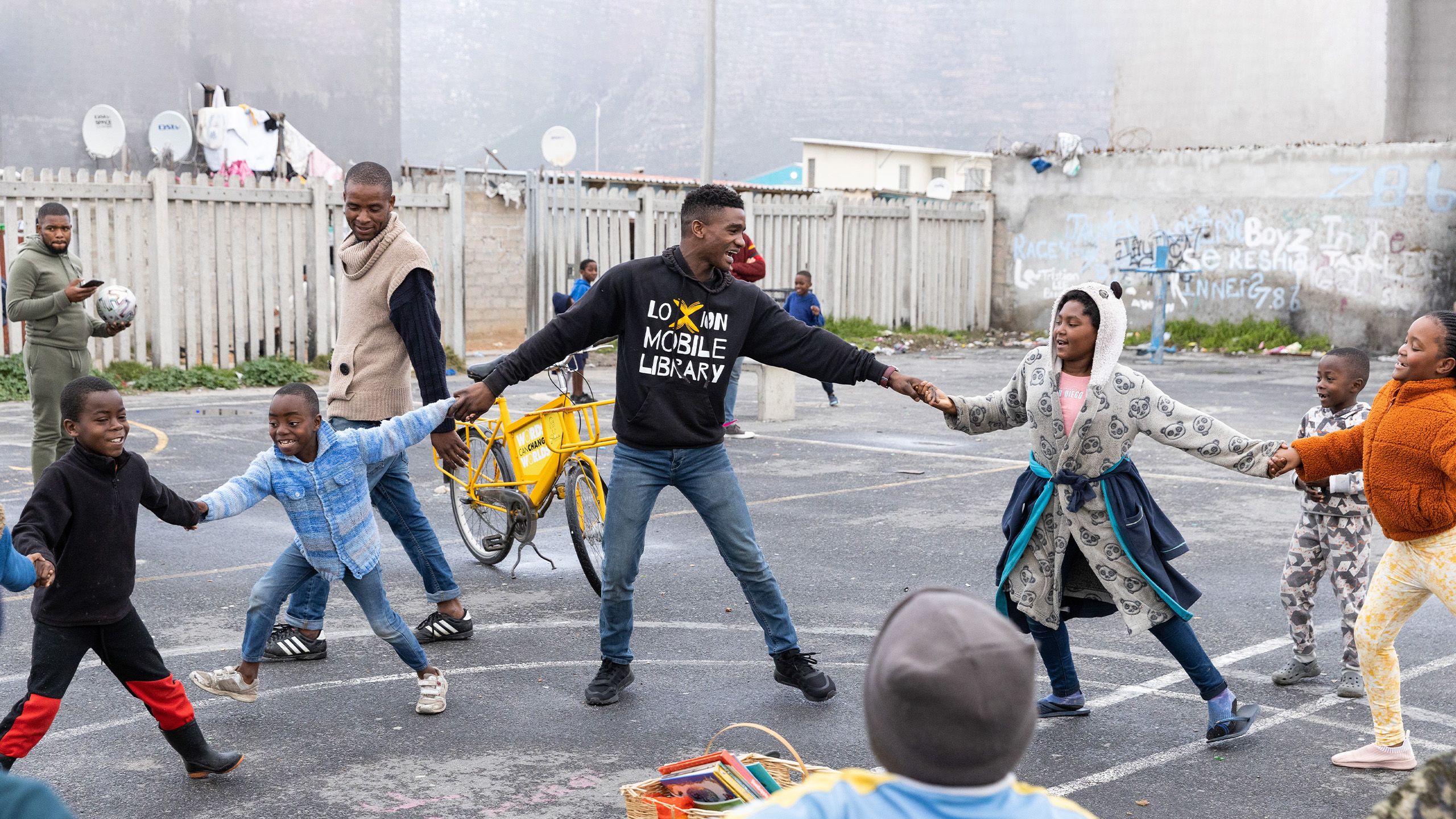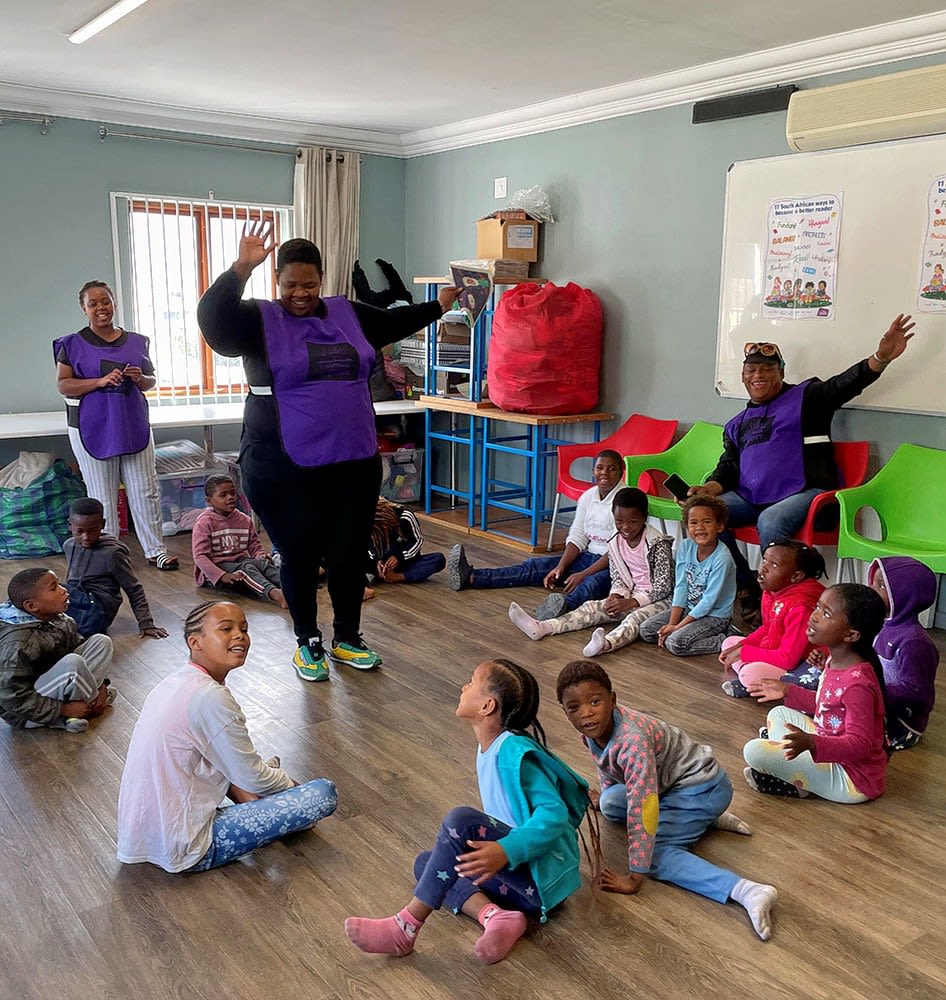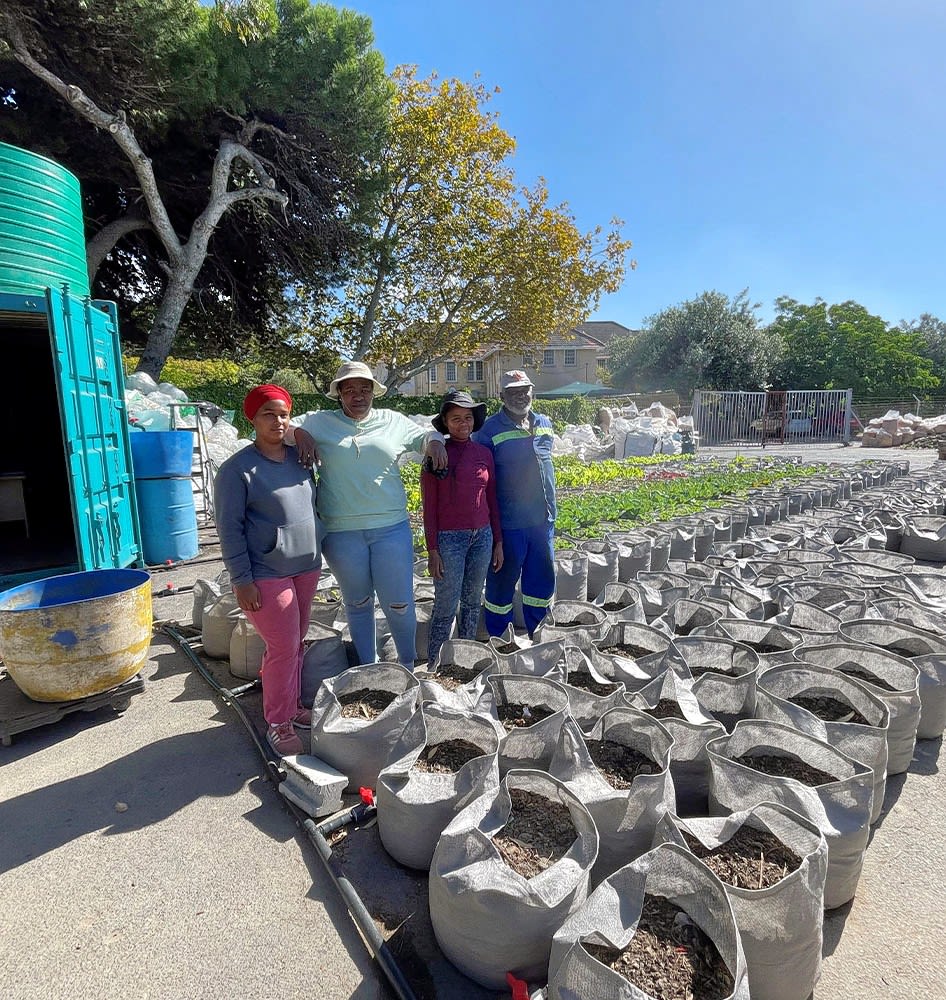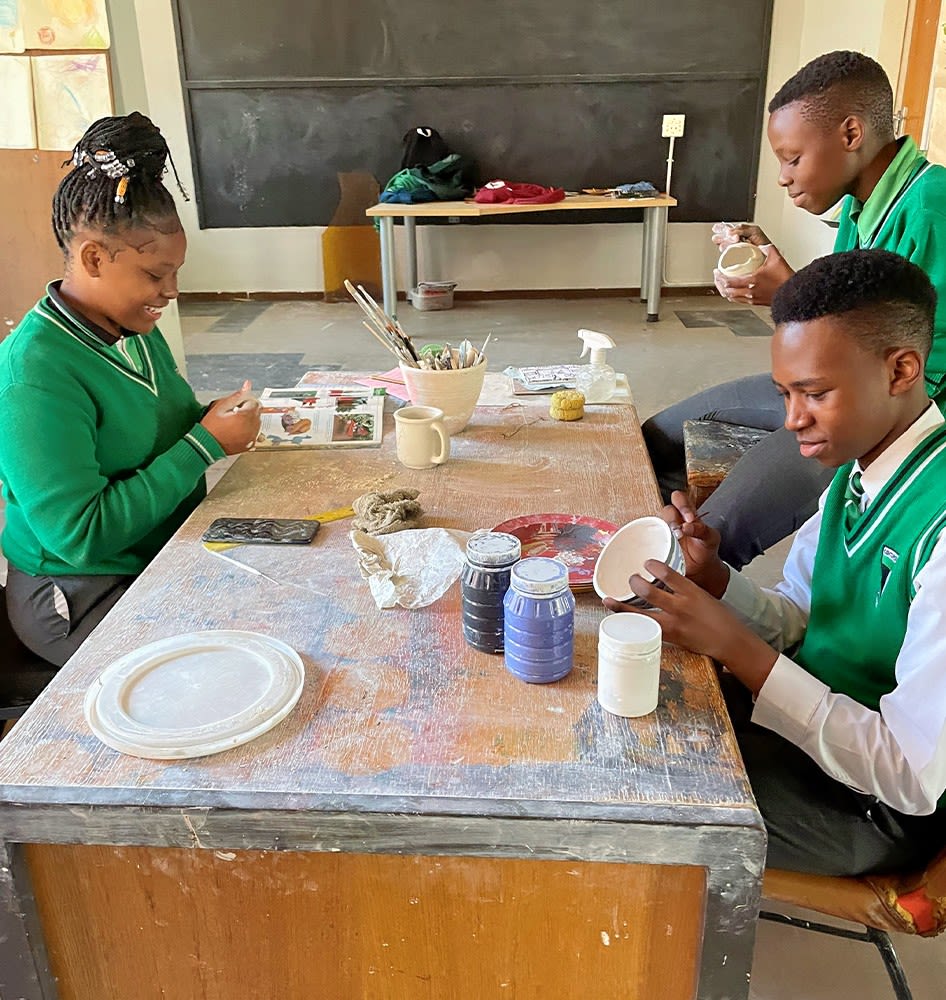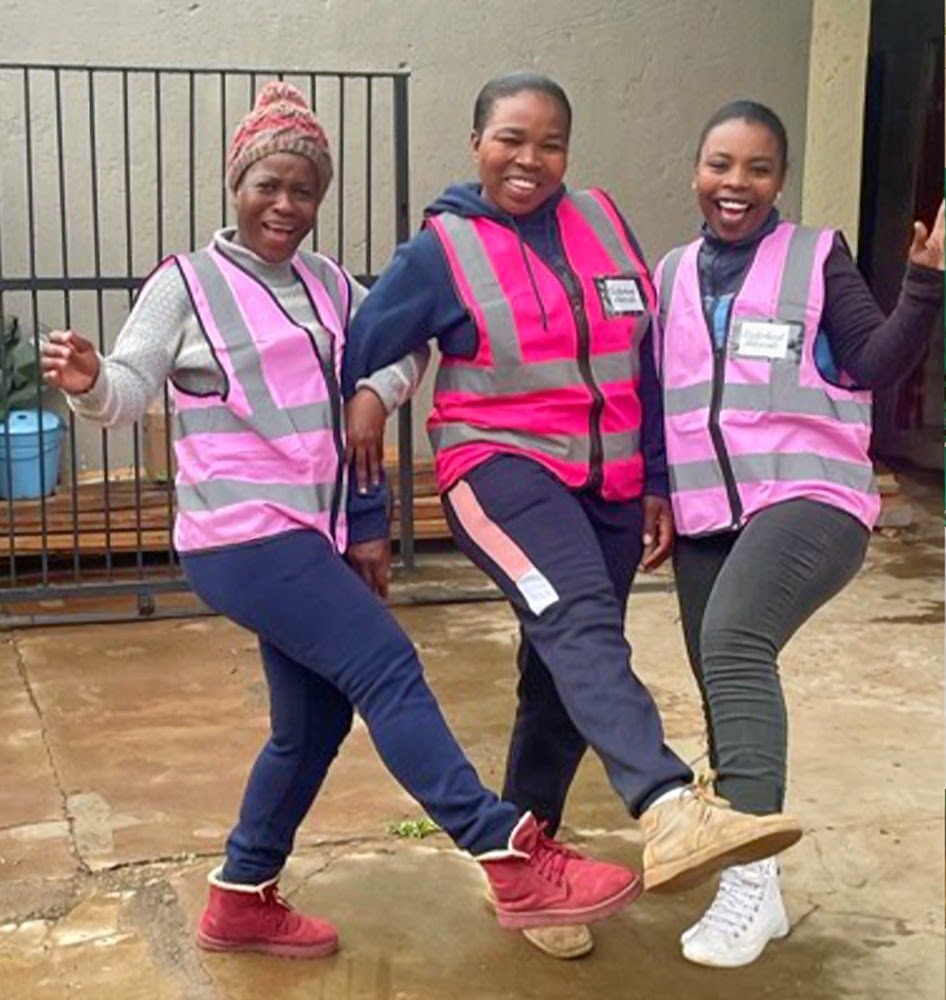The business of boosting equality: South Africa’s mission to create decent jobs

In one of the world’s most unequal countries, helping more people to access quality education and decent jobs is a no-brainer. The battle’s being fought on multiple fronts: from multinationals investing in robotics classes for kids, to state-funded bodies paying an army of community volunteers, to co-operatives defending the rights of the most maligned workers. There’s no perfect solution, but momentum is gathering as these many varied players intermingle, join forces – and sometimes clash.
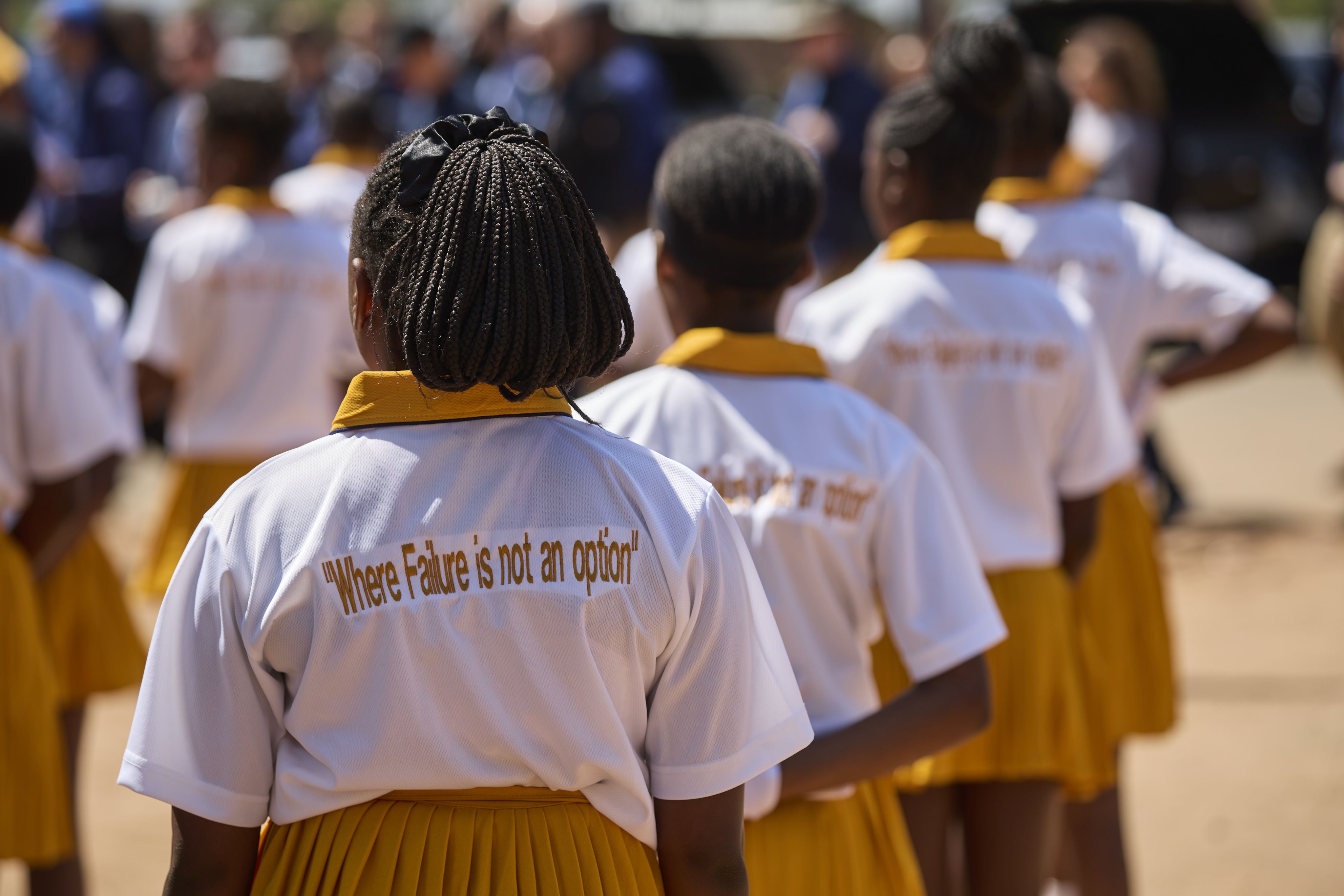
“Failure is not an option” is the tough-love motto at Lethabong Secondary School in Soshanguve, a township near Pretoria, South Africa. The aspiration isn’t far off: last year 93% of students passed their final year exams. But the pressure may have upped a notch now, with Lethabong the first of 19 schools in the country to be funded by carmaker BMW Group as part of a partnership with Unicef that’s equipping students with skills including robotics and coding. Graduates not only have a decent chance at getting work at BMW’s nearby manufacturing plant, some are expected to do so. The company will spend €2m on renovating the school, after which it will become a ‘School of Specialisation, with a Focus on Automotive’.
Association with a premium brand clearly has its appeal. At a press event last November to mark the new partnership, headteacher Mmphefo Malope was bursting with pride as she thanked the German carmaker for its “love and support”. (Others in South Africa point out the brand’s aspirational status: the acronym, they joke, stands for ‘be my wife’, or ‘Black man’s wish’.) BMW employees were beaming with pride too, as they talked about the new initiative. Ilka Horstmeier, labour relations director at the multinational, told students that above all the company wants them to “have a real chance in life”.
Read: BMW-Unicef partnership launches amid carmaker's drive to be 'responsible corporate citizen'
There are other motivations at play, of course. The automotive industry is one of South Africa’s biggest employers, and a pipeline of skilled workers is business-critical. But experts point out that boosting youngsters’ skills in science, technology, engineering and maths has much broader benefits: robotics projects, for instance, build experiences crucial for any job: communication, teamwork, reliability. “Soft skills are the new hot skills,” says Busi Mkhumkuzi Pooe from Thinkshift, a training provider engaged by Unicef. With South Africa’s staggering unemployment rates, at 32% overall, and 58% among 15 to 24-year-olds, anything that helps people into decent jobs is arguably the clearest way to make a difference.
Hear more from Busi Mkhumkuzi Pooe of Thinkshift on how robotics projects build crucial skills for the future:
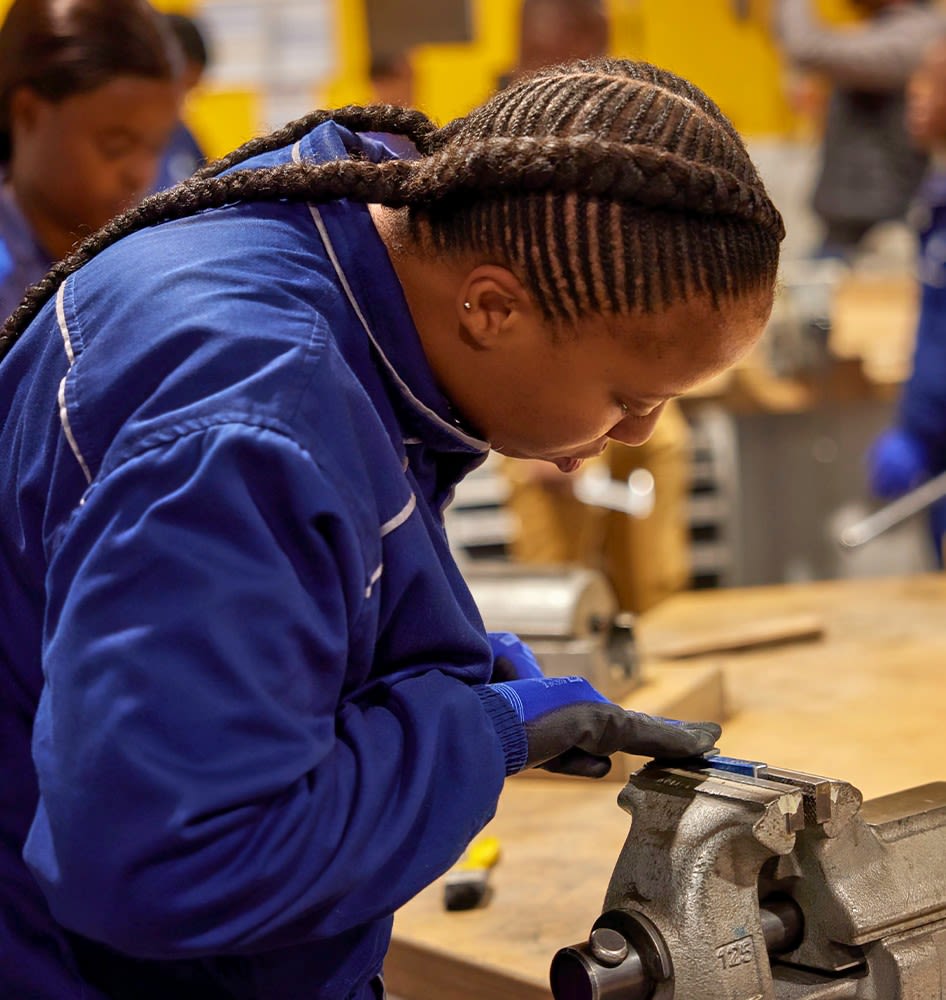
BMW's manufacturing plant, located close to the Lethabong school, employs some 2,500 people
BMW's manufacturing plant, located close to the Lethabong school, employs some 2,500 people
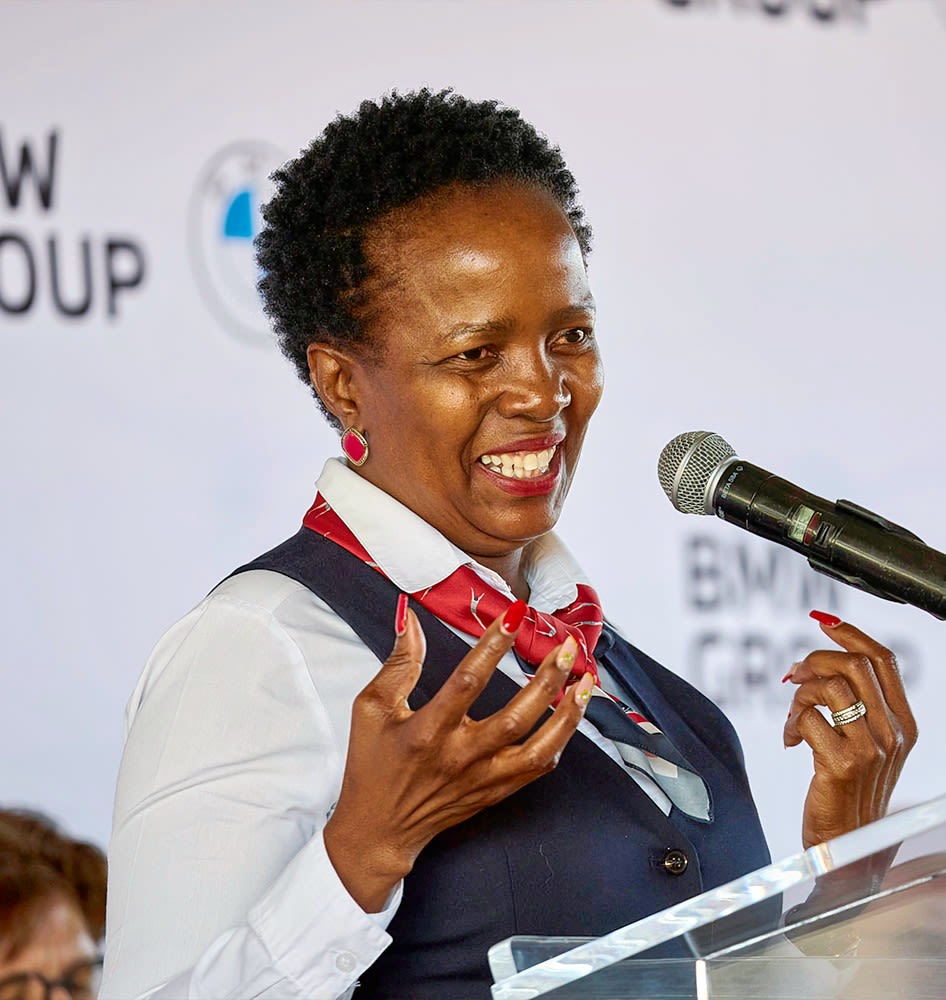
Lethabong's headteacher, Mmphefo Malope, addresses an audience of journalists in November 2023
Lethabong's headteacher, Mmphefo Malope, addresses an audience of journalists in November 2023
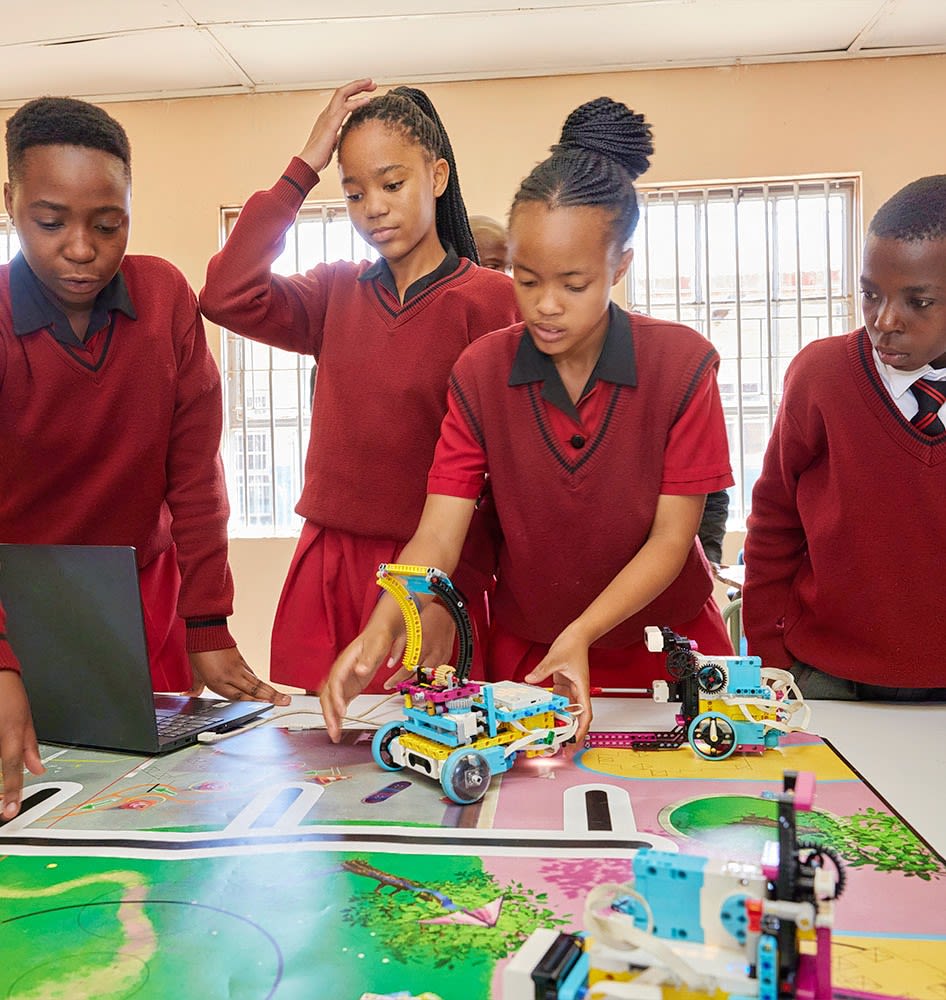
Robotics projects can develop skills and experiences in communication, teamwork and reliability
Robotics projects can develop skills and experiences in communication, teamwork and reliability
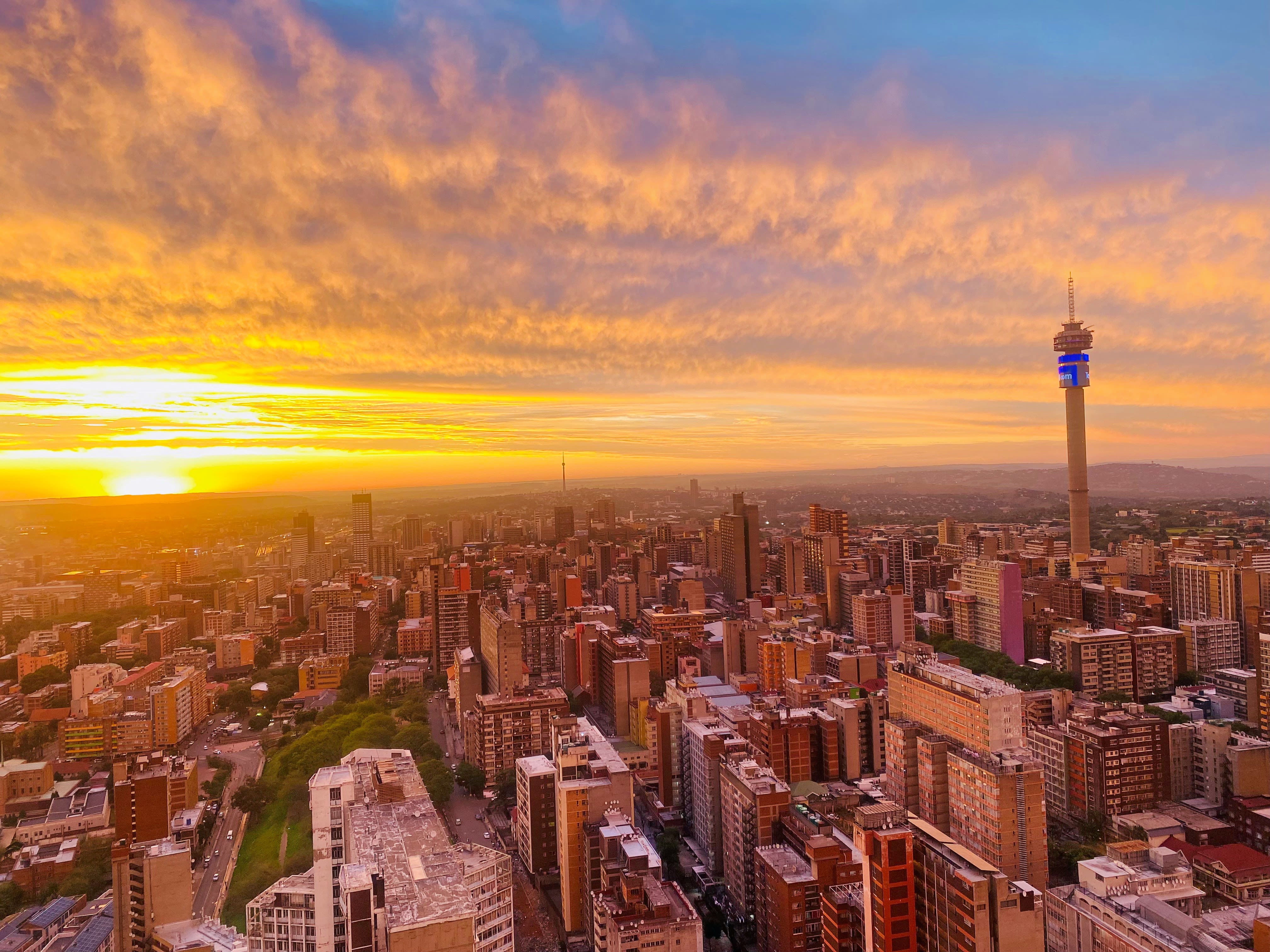
Business as a force for good
Business as a force for good is much needed in South Africa. Despite a remarkable recovery from the apartheid years, a litany of problems has followed. By 2022, the World Economic Forum was warning that the country risked state collapse, with record unemployment, high levels of crime, unsustainable state spending, mismanagement and corruption. A severe, worsening electricity crisis causes daily power cuts, and in a recent poll just 22% of South Africans said they trust the government, compared with 62% who trust business. Operating against a backdrop of deep social inequality, large firms understand “that they need that social licence to operate”, says Jana van Deventer, an economist and research manager at Johannesburg-based Krutham.
It was another carmaker, General Motors, that kicked off the country’s current era of corporate social responsibility: in 1977, a member of GM’s board established principles that became widely accepted ground rules for American firms operating in South Africa. Today, among emerging economies, South Africa is perhaps the most advanced in corporate responsibility; the Johannesburg stock exchange was the first worldwide to establish a sustainability index, in 2004. There is also a sort of government-enforced corporate responsibility in its ‘Broad-Based Black Economic Empowerment’ (B-BBEE) policy, which since the early 2000s has sought to compel businesses to help underprivileged South Africans – through employment, supply chains, ownership and more – and thus help to transform the economy.
To some extent this flagship policy has worked. “We’ve created a critical mass of people that were previously excluded who now can participate in the mainstream economy,” Ongama Mtimka, a lecturer on history and politics at Nelson Mandela University, told visiting journalists last November, at a dinner hosted by BMW Group. The growth of the post-apartheid economy was driven by “black diamonds”, he says: Black people who now had financial means (and who could now buy BMWs).
But income inequality between the white minority and others in South Africa remains vast. Apartheid’s legacy runs deep. Education made available to Black South Africans was designed to prepare them for menial jobs: “absurd” to teach a child maths, the future prime minister argued in 1953, when they would not need it. Today, children are raised by parents who were failed miserably by this policy, and the cycle of disadvantage continues.
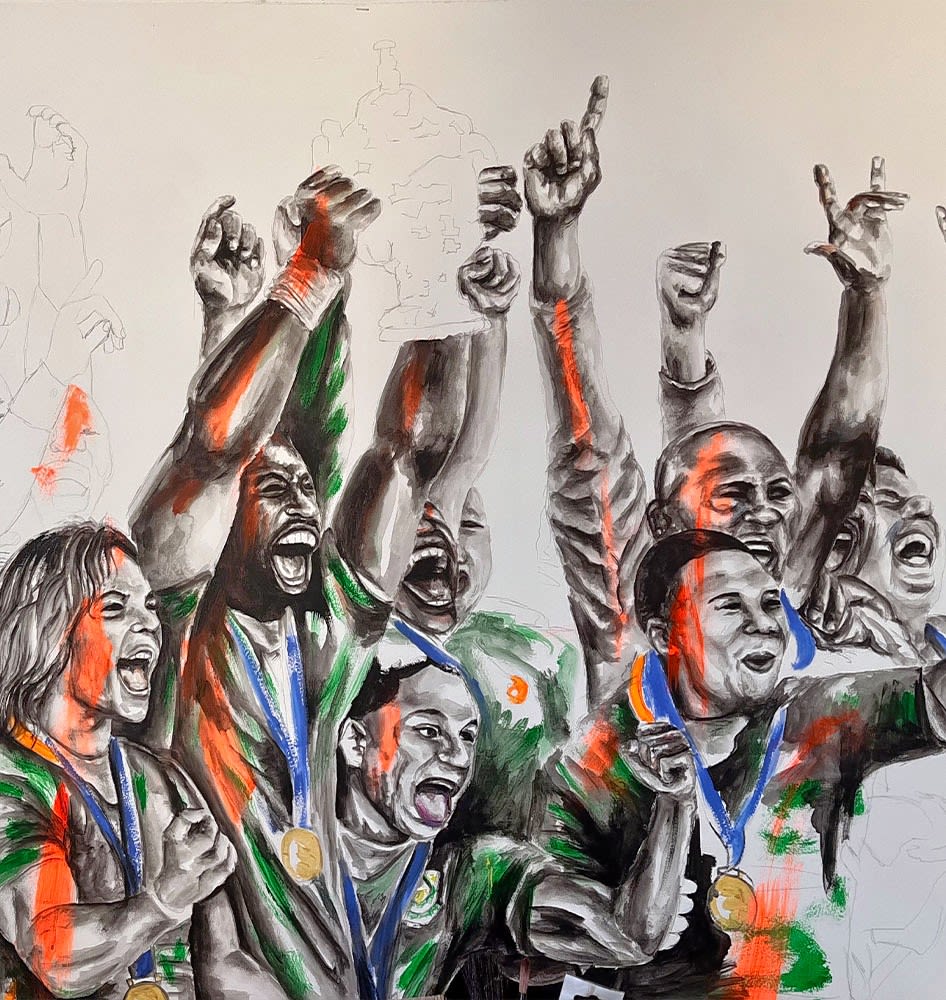
South Africa's Rugby World Cup win in 2023 provided a much-needed boost to the national mood
South Africa's Rugby World Cup win in 2023 provided a much-needed boost to the national mood
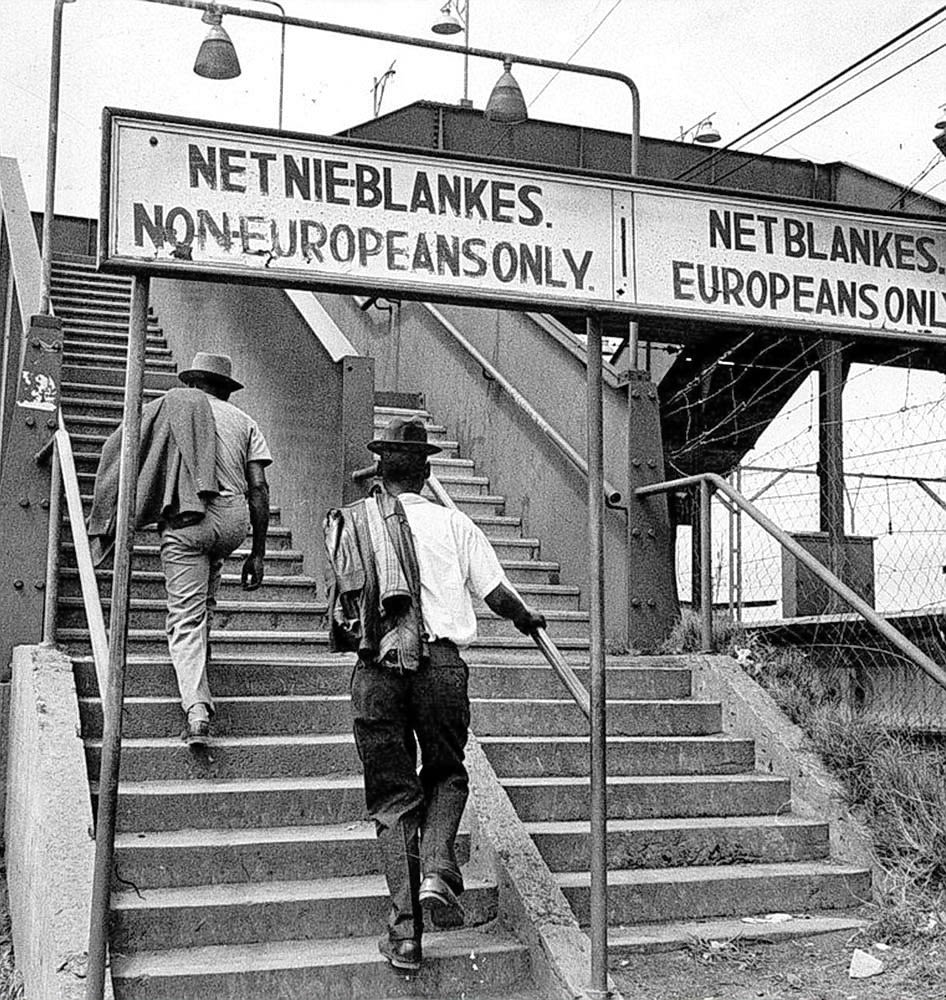
The legacy of apartheid means that income inequality persists
The legacy of apartheid means that income inequality persists

Just play: social enterprise success
Look up in Johannesburg, and you can’t miss Ponte City: a cylindrical concrete tower that in its 1970s heyday was Africa’s tallest residential building. Through the 1980s and 1990s, it earned a more dubious fame, notorious for drug dealing, prostitution and poverty. Joburg parents would warn their children to behave, or end up in Ponte.
Ponte City and the surrounding Hillbrow neighbourhood have seen a dramatic revival, with middle-class and professional residents now among the building’s occupants. The notoriety is still hard to shake off. On the Saturday morning when Pioneers Post visits, there are blood stains on the tarmac by the metal security gates at the compound entrance: a shooting last night, someone says. But it still attracts visitors, thanks largely to social enterprise Dlala Nje, which runs tours of the building and the neighbourhood, offers workshops and rents out its trendy 51st-floor bar, using the income to provide arts and education programmes for around 100 children and teenagers.
Read more from Dlala Nje founder Michal Luptak: “Africa is the next mecca for innovation and entrepreneurship”
Dlala Nje – the name means ‘just play’ in isiZulu – is among those to benefit from IDC’s Social Employment Fund, which pays the wages of dozens of its workers including cleaners and workshop leaders. The fund has helped it to recover from a difficult period during Covid-19 when it had to cut back many paid roles, CEO Grant Ngcobo says. Things look more positive now, and Dlala Nje is hoping to create a similar project in the Soweto township, an increasingly popular destination for tourists visiting South Africa.
Ngcobo, now 26, grew up in the building and used to visit Dlala Nje as a 14-year-old “to stay out of trouble”. For him a key part of the project – alongside providing opportunities for young people, and paid work for adults – is changing perceptions and challenging the stigma of the area. That matters because it would bring more opportunities into the neighbourhood for people living there, he says. There is big potential in developing tourism, for instance. “We want to show people a different side of Hillbrow… There’s a lot of history, a lot of iconic places for people to visit.”
Hear more about why challenging perceptions matters, from Dlala Nje CEO, Grant Ngcobo:
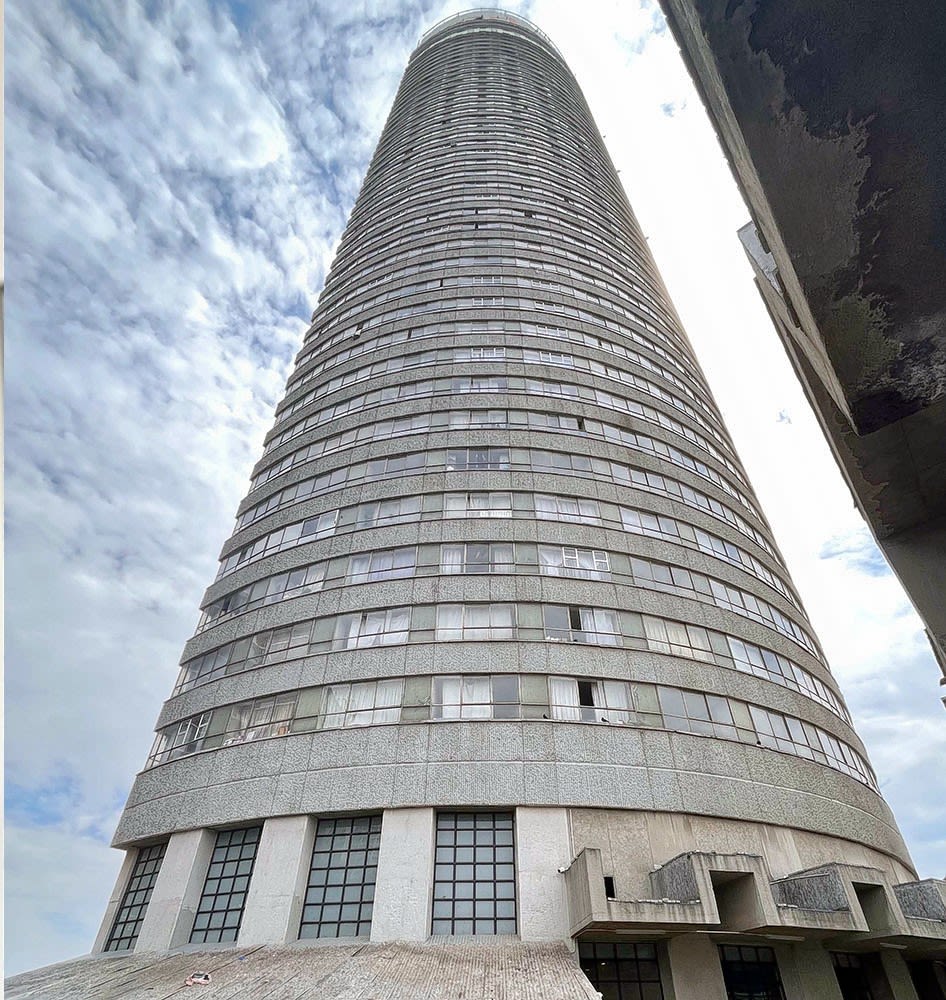
After a troubled past, Ponte City is now home to many middle-class and professional residents
After a troubled past, Ponte City is now home to many middle-class and professional residents
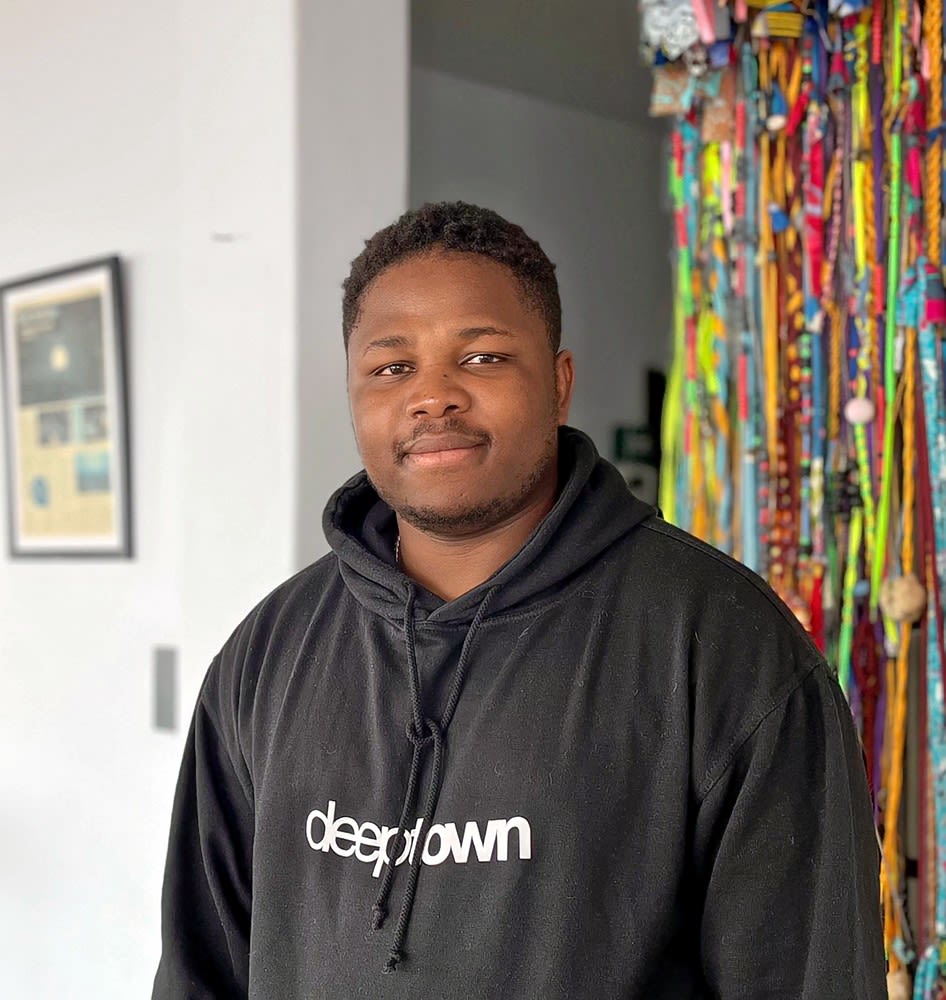
CEO Grant Ngcobo used to visit Dlala Nje himself as a teenager
CEO Grant Ngcobo used to visit Dlala Nje himself as a teenager
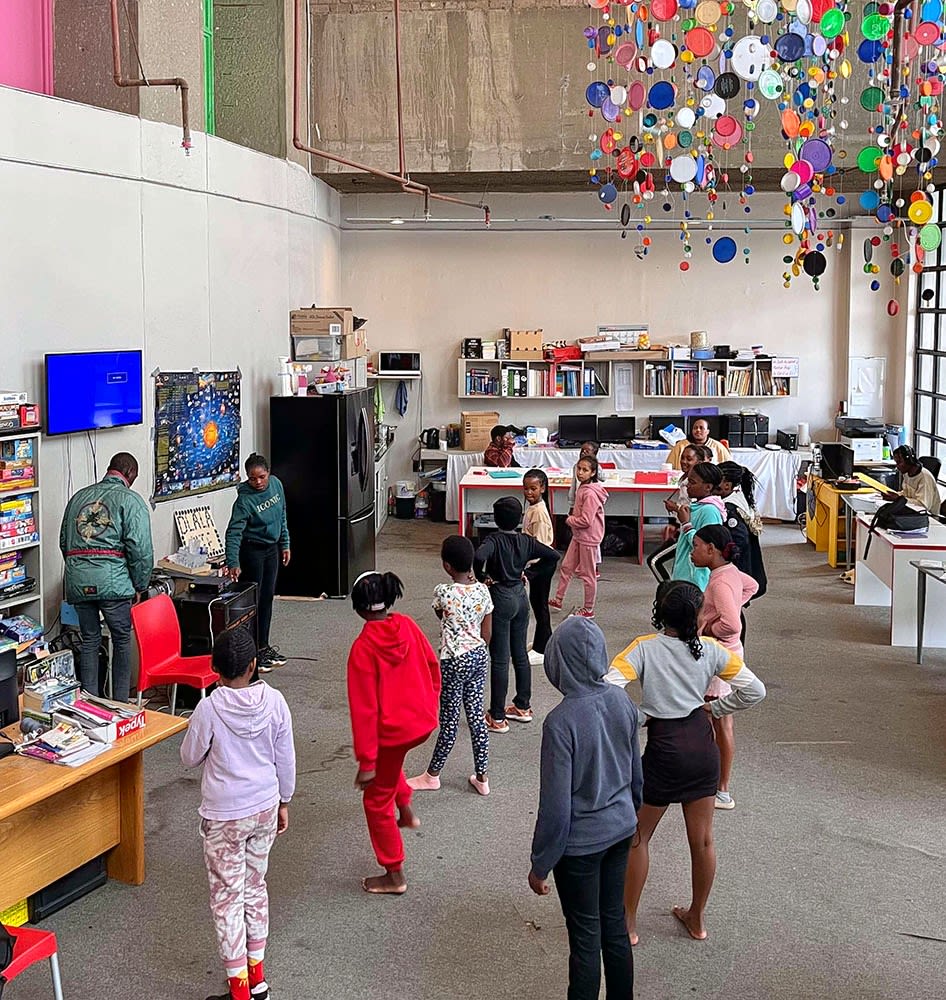
Dlala Nje provides arts and education programmes for some 100 kids and teens
Dlala Nje provides arts and education programmes for some 100 kids and teens
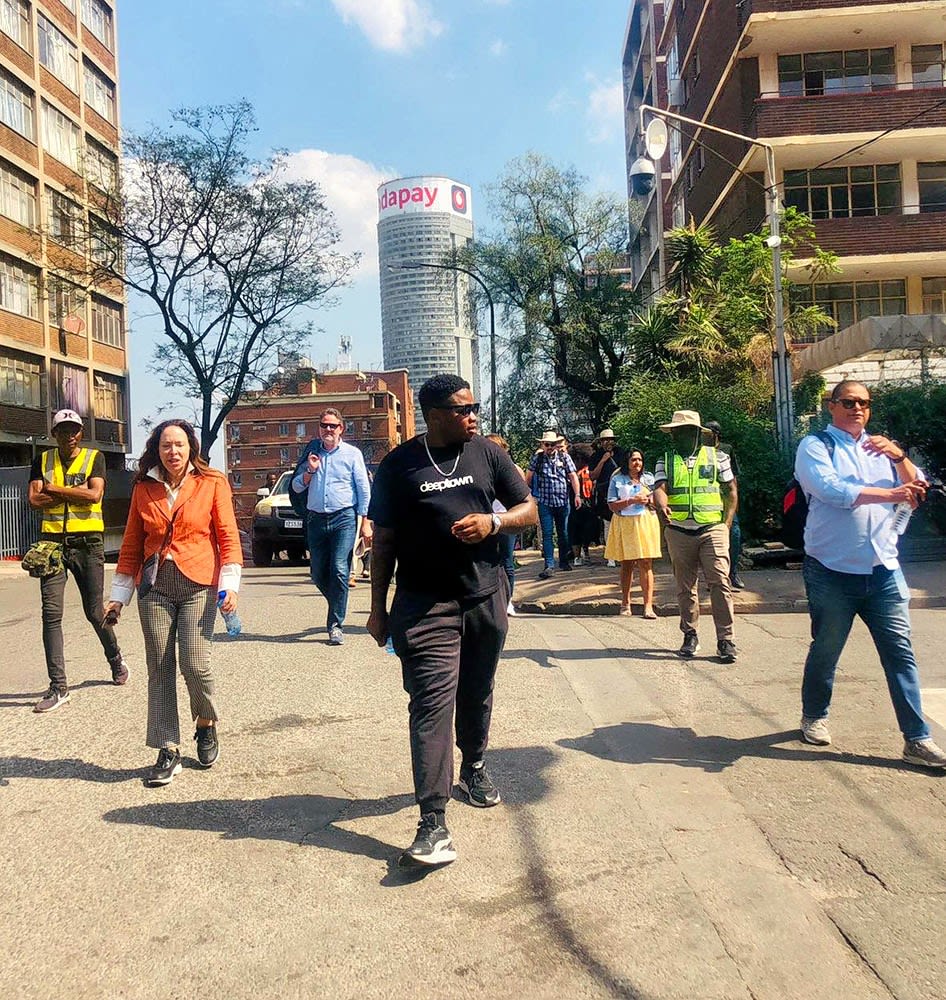
The social enterprise challenges negative perceptions through its guided tours of the area
The social enterprise challenges negative perceptions through its guided tours of the area
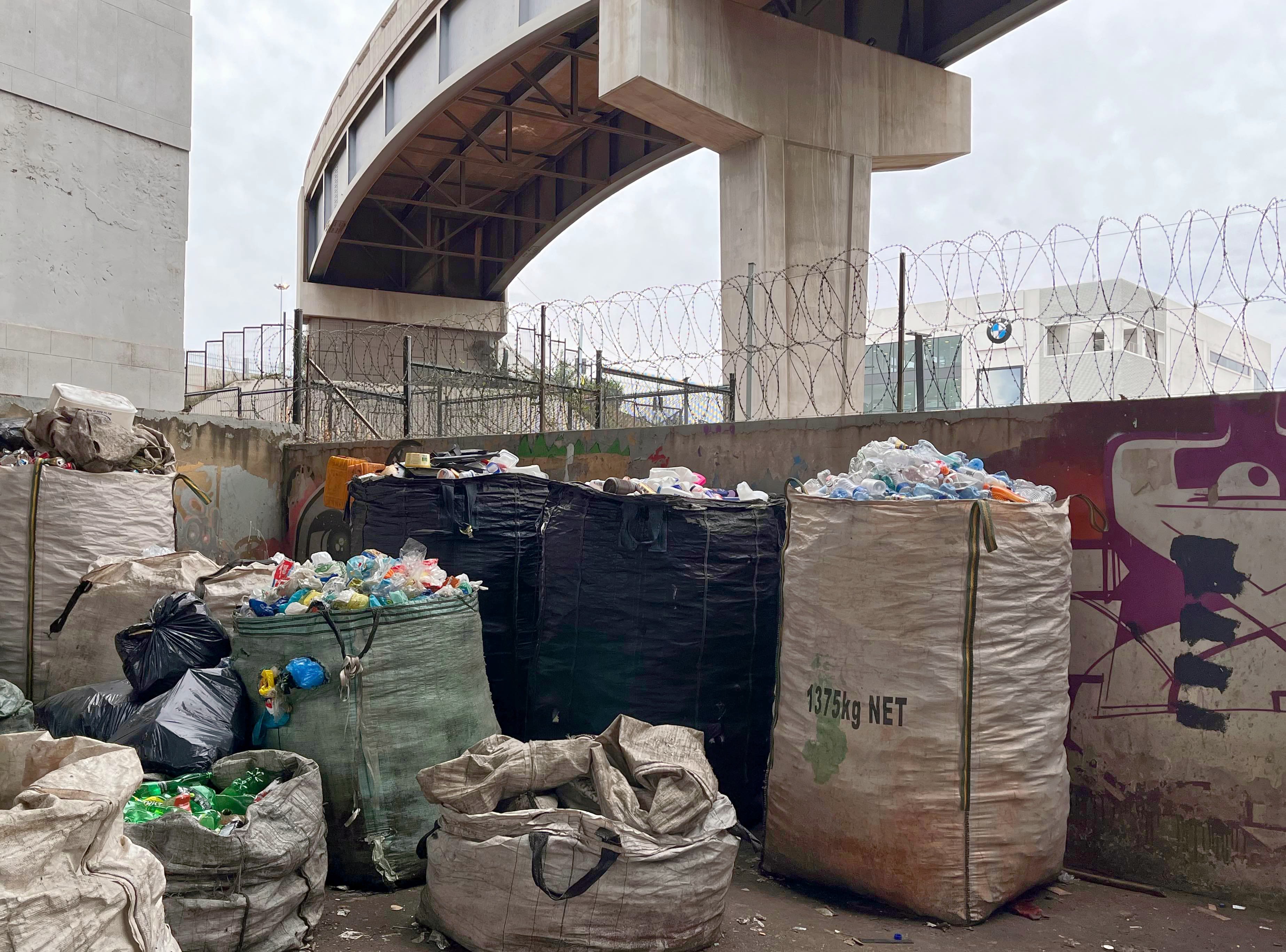
Drivers of the circular economy
Luyanda Hlatshwayo knows what stigma feels like. As one of an estimated 60,000-90,000 South Africans who make a living by gathering waste, sorting it and selling it on to recyclers – onlookers often view him with suspicion and fear. “People don't understand. They’d say, ‘Why are you wearing a balaclava? You look like a criminal!’” The explanation is pretty simple. “Well, your waste stinks, that’s why…”
We are standing beneath an overpass, a stone’s throw from a busy shopping mall in Newtown, central Johannesburg. Enormous sacks, filled with plastic bottles and packaging, tin cans and other sorted waste, are awaiting their next destination. “This is like our bank,” Hlatshwayo says. It is one of around 40 such sites in the city.
South Africa’s ‘reclaimers’ as they are known, salvage up to 90% of the packaging and paper that is diverted from landfill, saving the authorities millions of dollars each year, according to research by the University of Johannesburg. But, instead of recognition, they face harassment and stigma. At one point, “areas like this were burned down, our trolleys were confiscated,” says Hlatshwayo. Things are changing, particularly since 2020, when the South African government formally integrated waste pickers within its waste management policies. But it’s a work in progress.
Hlatshwayo has become an unofficial spokesperson for the African Reclaimers Organisation, a member-driven nonprofit that represents reclaimers of all nationalities in South Africa. Its achievements are impressive. In the past years, it has organised marches and mobilised residents to prevent contracts being given to commercial companies, which would have displaced informal workers who were doing the same job for free. ARO is in the process of formally registering workers one by one, so that they can be paid a small fee for their work; it delivers workshops in schools; and in 2021, it won the World Wildlife Fund’s Living Planet Award, which recognises “exceptional” organisations that inspire people to live in harmony with nature.
Dr Melanie Samson, a human geographer at the University of Johannesburg who has been researching this subject for the past decade, believes that ARO creates another important benefit. Reclaimers are informally redistributing wealth – by repurposing the valuable items discarded by wealthy people – and even challenging urban segregation. This is because the (mostly African, mostly poor) reclaimers must enter the wealthy, white zones of the city to do their work. “They are unsettling these post-apartheid boundaries of race and class as they move through spaces where they're not supposed to be. So they are really helping, in a very grounded way, to transform the city,” says Samson.
The relationship between African Reclaimers Organisation and big business has been fractious at times. The residents of Bekezela, an informal settlement next to ARO’s Newtown site, have withstood violent attempts at eviction, in one case initiated by Prasa, the state-owned rail company that owns some of the land there. And Newtown is “vibey” now, Hlatshwayo says: big firms are opening premises here, but aren’t always fond of their reclaimer neighbours. “They literally had a problem with their brand [being] next to us,” he recalls. “Their first approach was very hostile.”
Relationships have been more positive when reclaimers have defined the terms of engagement. When Unilever approached ARO offering funding, the reclaimers got them to run a pilot project to test if they could, for the first time, be paid a fee for providing an efficient, cost-effective ‘separation at source’ service; they argued that a fee would increase collection rates of recyclables. This pilot helped convince the authorities to make this official: South Africa’s Extended Producer Responsibility Regulations now require industry to pay reclaimers that are registered on the system for the services that they provide. It’s a “big win”, Hlatshwayo says, even if the fee they get is much lower than in the pilot, suggesting “they don’t really recognise us yet”. But ARO was willing to get the system in place first, ensure industries see the need to pay that fee, and then negotiate later.
ARO is perhaps stubborn to a fault. It has “declined many offers” from firms seeking collection services, because, says Hlatshwayo, “we will only work with people that properly recognise us. Not for pity”. In other words, with those who have bothered to read – and agree with – national guidelines on integrating waste pickers in formal processes.
Hear more from Luyanda Hlatshwayo on why the government must consult with reclaimers – and on his dreams for a “new reclamation centre”:
While attitudes towards reclaimers are shifting – part of a wider, worldwide recognition of their essential frontline role in the circular economy – the daily reality remains physically gruelling. Many are overworked, living on the breadline. But for Hlatshwayo and his fellow organisers, it’s clear that this is “not just about recycling any more” – it’s about recognition, dignity, agency. Education plays a part in this. He himself wants to return to school, to pursue a love of writing. He cites ARO’s early childhood development centres as one of its proudest achievements; in the housing complex next to the Newtown site, where many reclaimers live, he is keen to point out a primary school. The next step is perhaps logical: “What’s going to stop us from building universities, where people can go for free?”
What does ARO’s rise mean to him personally? “It's given [me] purpose. I'm no longer looking for another job,” Hlatshwayo says. Then, he quickly adds, “there’s no jobs in South Africa anyway”.
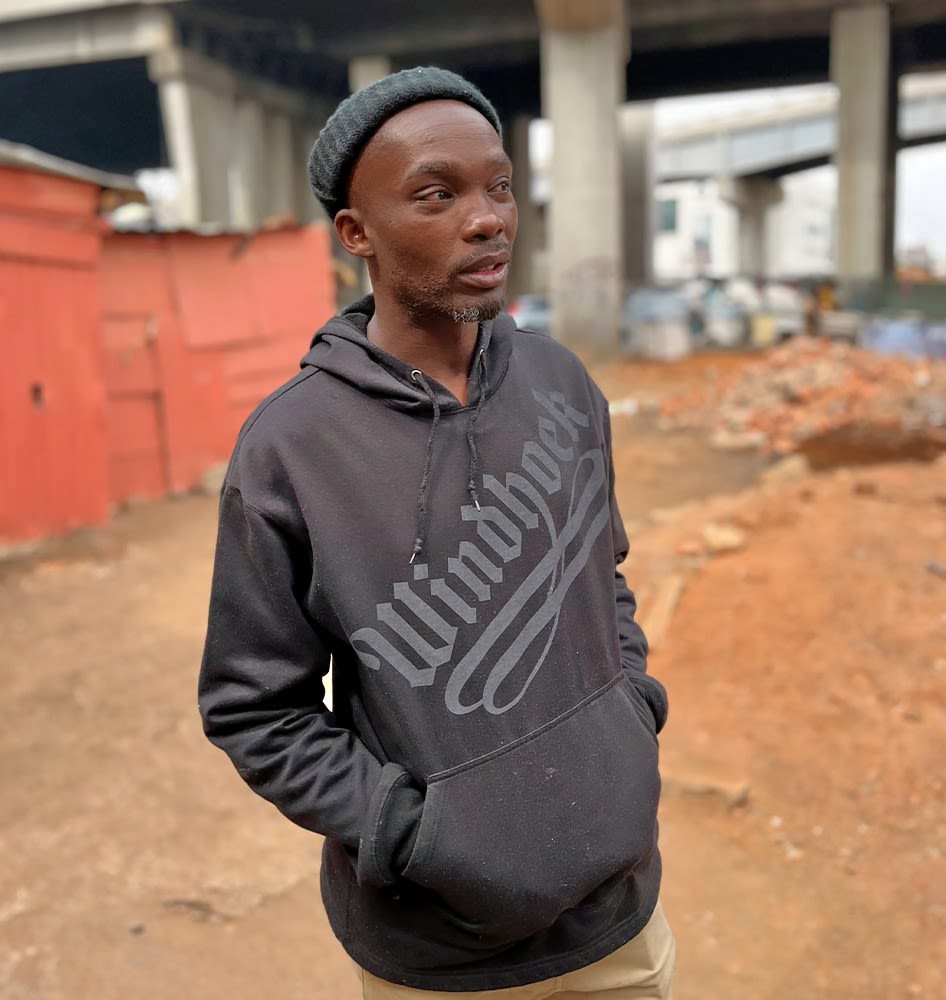
Luyanda Hlatshwayo: "We will only work with people that properly recognise us. Not for pity"
Luyanda Hlatshwayo: "We will only work with people that properly recognise us. Not for pity"
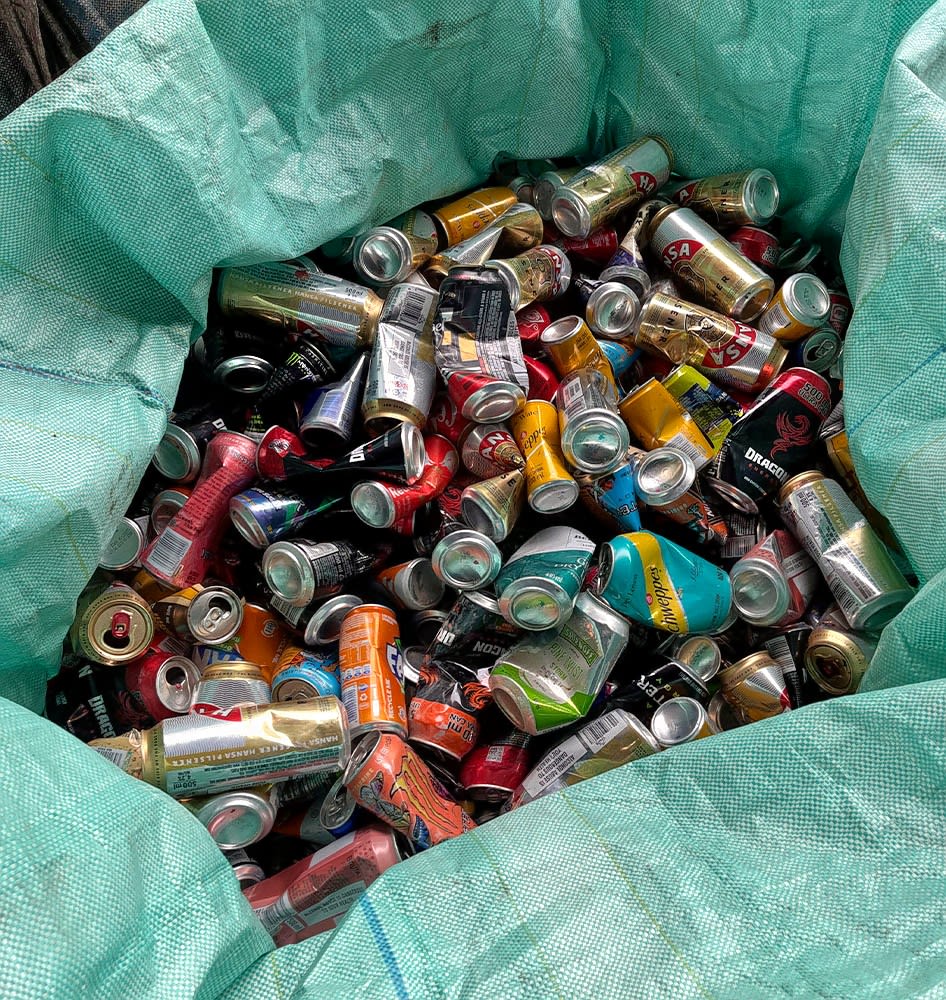
South Africa’s ‘reclaimers’ salvage up to 90% of the packaging and paper that is diverted from landfill
South Africa’s ‘reclaimers’ salvage up to 90% of the packaging and paper that is diverted from landfill
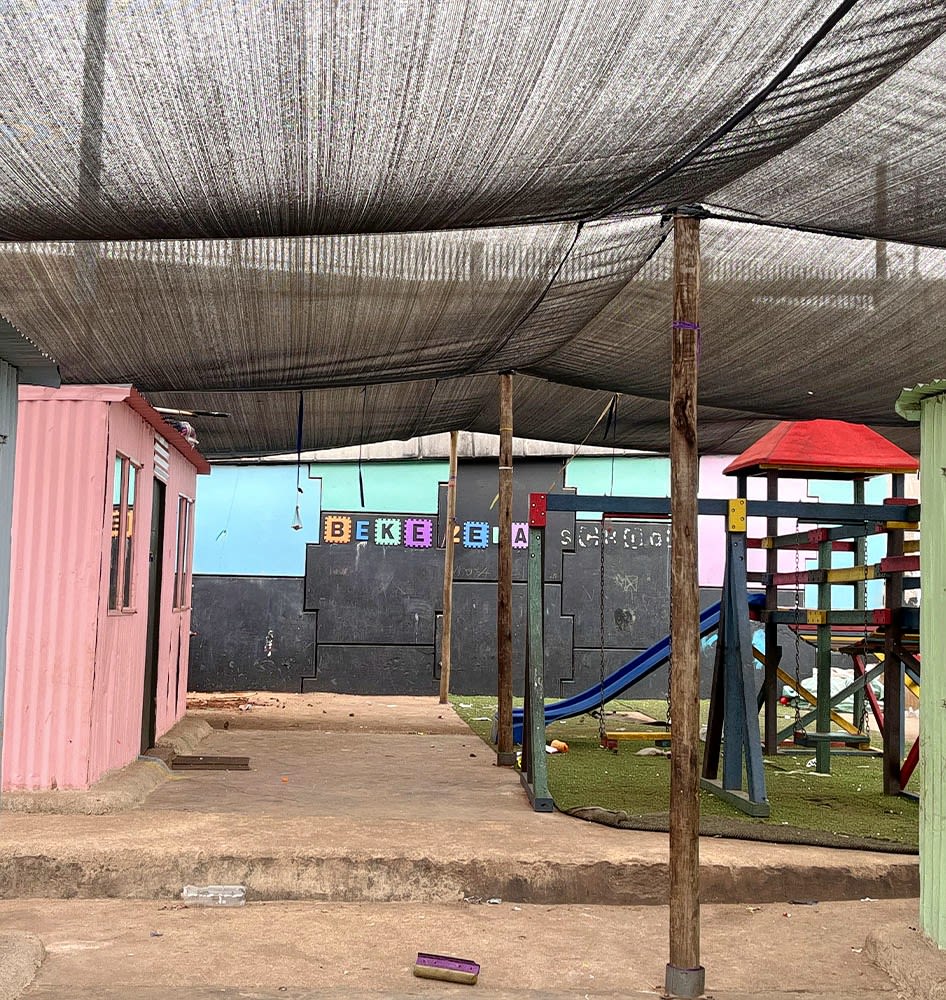
A primary school in the informal settlement next to the Newtown site. Next step: a university?
A primary school in the informal settlement next to the Newtown site. Next step: a university?
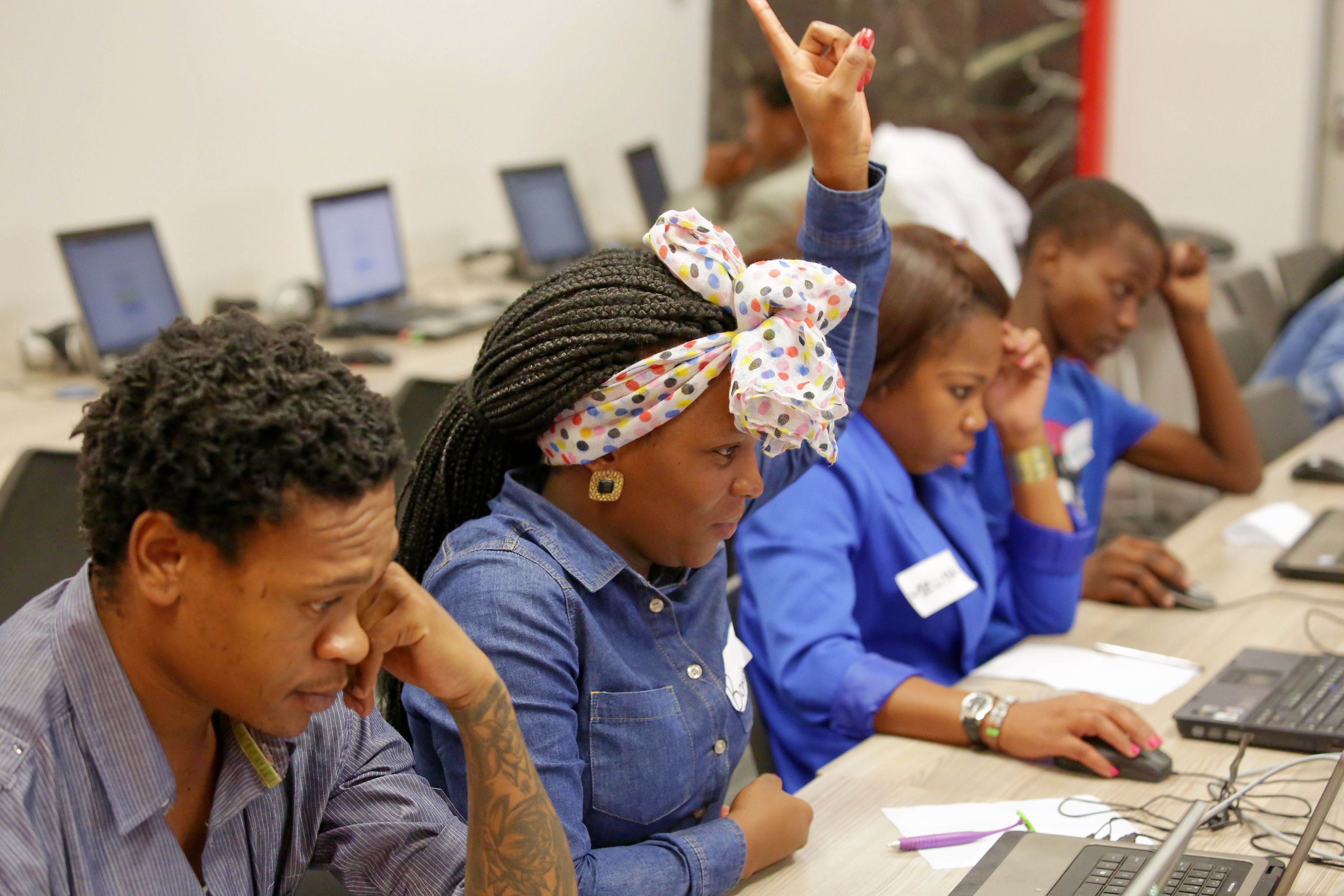
No
guarantee
Some 3.3m South Africans aged 15-24 are not in education, employment or training, according to latest figures. The youth unemployment challenge “dwarfs every other nation’s, and continues to grow”, as Harambee, a social enterprise that helps get young people into jobs, put it recently.
Read more in our special feature: Fresh solutions for Africa's jobs challenge: How social enterprises plug the employment gap
The issue is high on the policy agenda, with South Africa heading for crunch-time elections in 2024, and voters typically unimpressed by government efforts to tackle unemployment. The Presidential Youth Employment Intervention aims to ensure more opportunities for the 1.2m young people entering the labour market each year. One of its newest initiatives is the R300m (€14.6m) Jobs Boost Outcomes Fund, a pay-for-performance structure in which providers will only get government money when they have successfully placed “excluded youth” into quality jobs.
Multinationals are also part of the solution: companies like BMW directly employ thousands, engage those from more vulnerable backgrounds through apprenticeships, and, as part of the bigger automotive industry, drive demand for tens of thousands more jobs among suppliers. But it is unclear how increased automation will affect the job market. More broadly, experts warn that we should not expect corporations to solve South Africa’s wider problems of inequality, without “enormous efforts” by the government to push them in this direction. Corporate responsibility tends to be limited to “the bare minimum”, one researcher points out: visible but small-scale initiatives that “create an illusion of being socially responsible entities, when in fact they are more preoccupied with profit”.
For the younger generation, access to decent work – whether that is provided by big business, a time-limited government scheme, or a grassroots movement – will be life-changing. Failure to act, they might well say, is not an option.
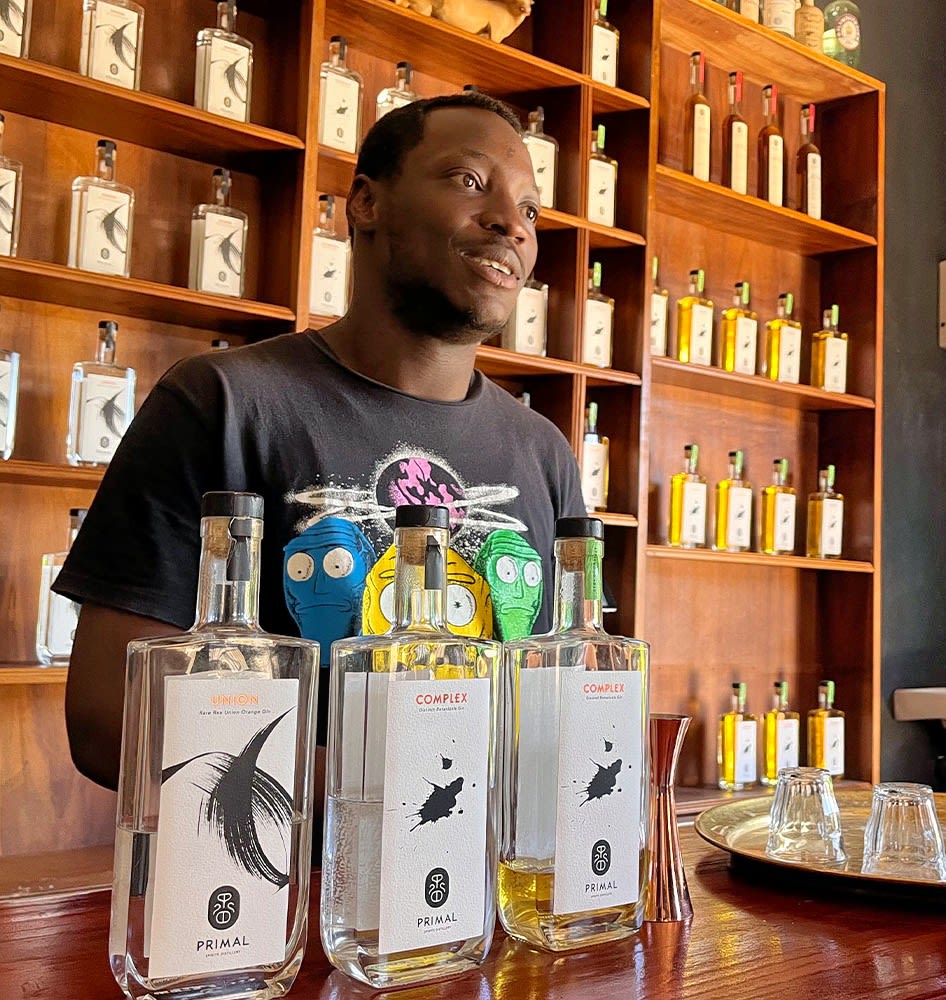
A gin distillery and shop in Victoria Yards, an urban regeneration project in Johannesburg that "prioritises both social development and business growth"
A gin distillery and shop in Victoria Yards, an urban regeneration project in Johannesburg that "prioritises both social development and business growth"
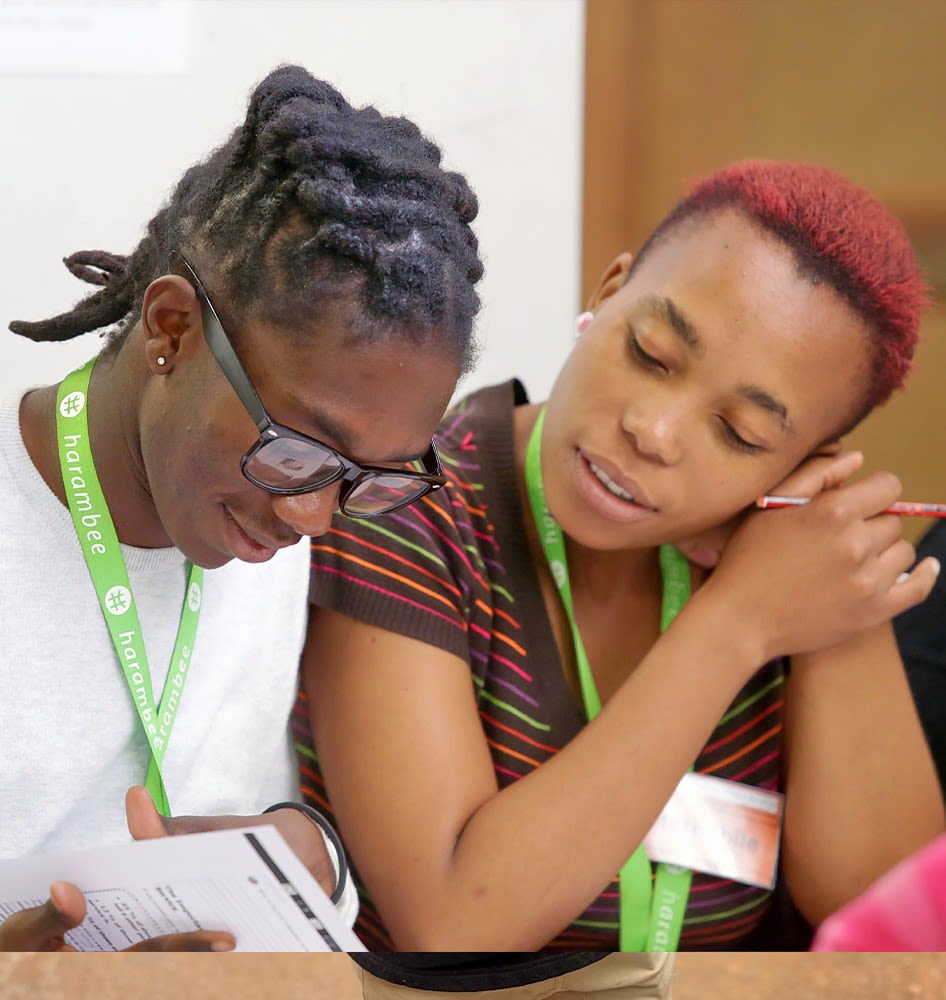
Youth employment is high on the policy agenda, and promoted by social enterprises like Harambee
Youth employment is high on the policy agenda, and promoted by social enterprises like Harambee
BMW Group funded Pioneers Post’s travel to South Africa. We retained editorial independence throughout.
Additional reporting by Imani Dlamini. Video shot and edited by Imani Dlamini
Photo credits: BMW Group; Dlala Nje; Ernest Cole/Wikimedia Commons; Industrial Development Corporation (Assitej, Nali Bali, Community Organisation Resource Centre, Learning Trust, Hlanganisa); Bhavanesh Parbhoo; Anna Patton; Harambee. Painting of rugby players by Arlindo Maunde (@arlindo_maunde)
Design: Fanny Blanquier

This immersive feature was produced by Pioneers Post, the leading global news platform for mission-driven businesses, social entrepreneurs and impact investors. We’re also a social enterprise ourselves, with profits ploughed back to support our community of positive changemakers. Support our work by taking out a subscription for yourself, your team or across your organisation.
Get in touch if you'd like to work with us to tell your story.

